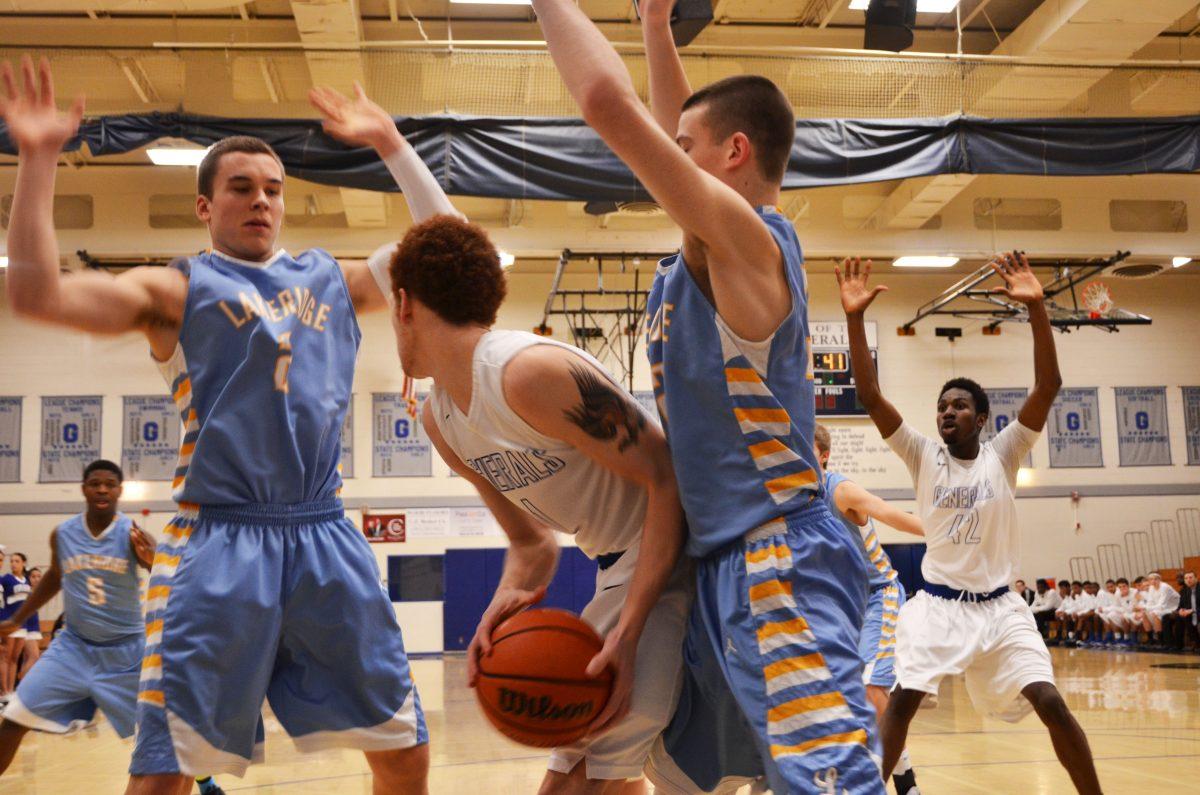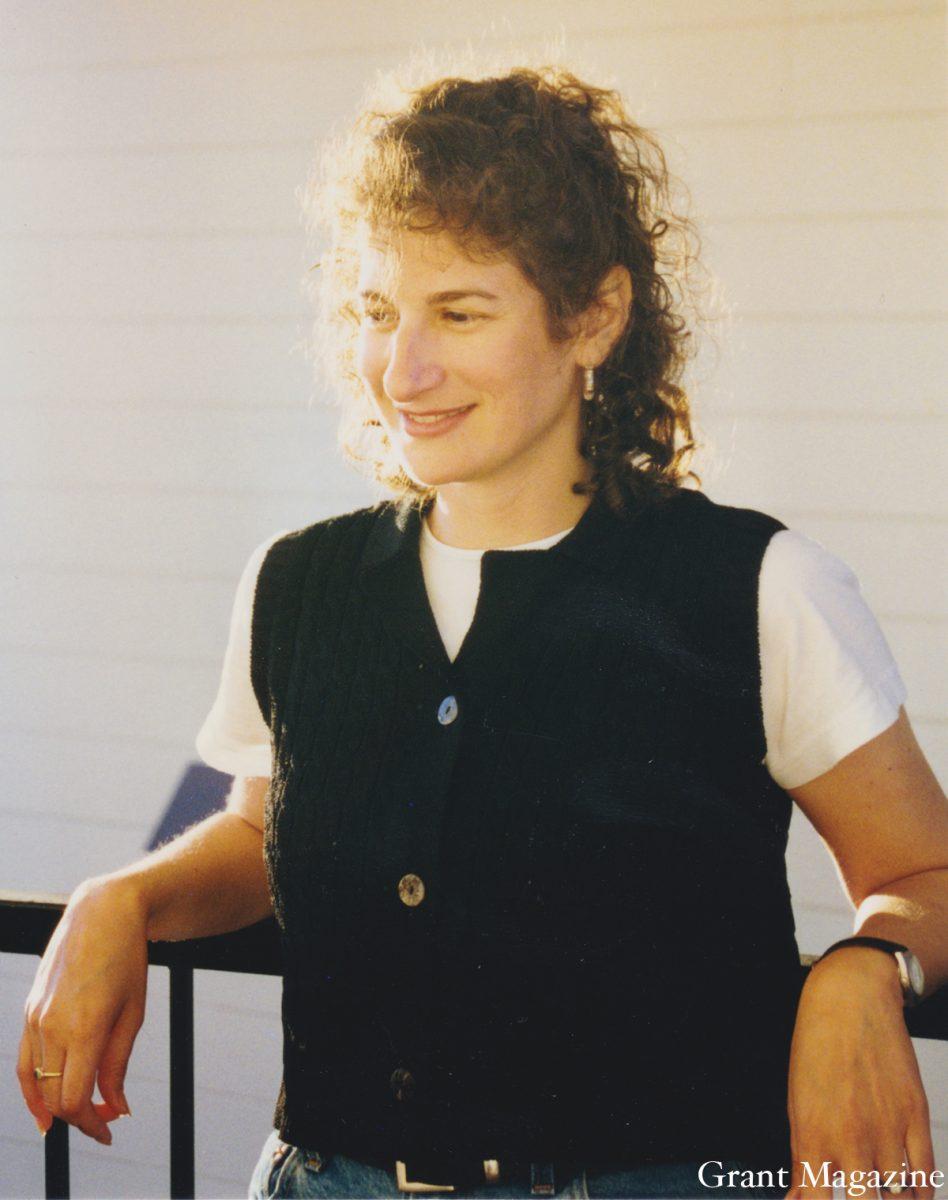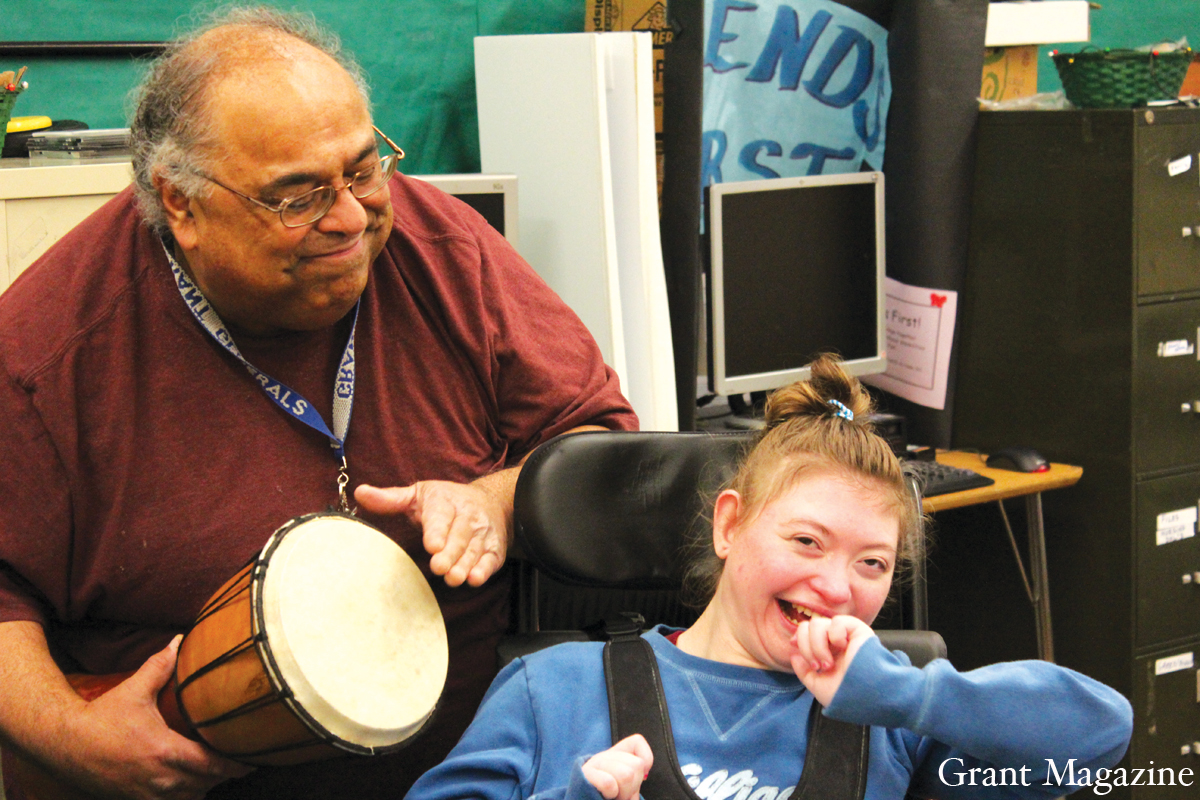
Ten months ago, Sam Schrader’s living room was an entirely different world. The room held the same furniture: a small brown sofa, the dark coffee table and a blue patterned chair accompanied by a footstool.
But the focal point of the room was not the coffee table, usually adorned with teacups and a plate of M&M cookies. The focal point was a hospice bed. That’s where Schrader’s 10-year-old sister, Ella Westervelt, spent her final days after a long battle with cancer.
A long three years had passed since her diagnosis of Non-Hodgkin’s lymphoma, with two close calls, two last resorts and multiple inaccurate prognoses. By April 7, 2013, the day she died, Schrader could only feel numb.
Today, the Grant High School sophomore still hasn’t come to terms with his sister’s death. “She was really great,” he says. “She was really mature for her age, in a good way. She had a really good sense of humor.”
Schrader and his parents, Carol Schrader and Ben Westervelt, are still transitioning into a life without Ella. Her death has left a gap in their lives and they are learning to live with the loss.
Sam Schrader has been hit pretty hard and says he’s been suffering from symptoms of depression. In addition to attending monthly counseling sessions with his parents and weekly individual therapy sessions, Schrader is facing a potential solution in antidepressants.
“It was hard knowing there was something going on but not knowing what it was.” – Carol Schrader
Home is also a complicated subject for Schrader. With his sister’s passing, Schrader became the only child in his household, making him the center of much of his parents’ attention. It’s all part of the new life he’s adjusting to.
Schrader was born in 1998. His sister came along four and a half years later. Years before having children, Schrader’s parents had agreed that Carol Schrader would share a last name with their first child and it was up to her husband to choose the first and middle name. When Ella was born, it was her mother’s chance to choose the first name of her daughter and the father’s last name was used.
The children grew up in the Sabin neighborhood. Schrader attended Beverly Cleary-Fernwood. His week usually included a play date or two with close friends, twins Fischer and Liam Jemison. He also liked to read and listen to music.
Ella Westervelt also attended Beverly Cleary and developed a passion early on for baseball. Playing in the Peninsula Little League, she was her team’s catcher. She spent a lot of time decked out in catcher’s gear or in the outfield, anticipating a pop fly. Though most young girls eventually make the transition from baseball to softball, she challenged the norm and continued with the sport she loved. She dreamed of being the first woman in Major League Baseball.
In July 2007, she was 4 years old when the family took a summer vacation to North Carolina. One of her lymph nodes became swollen and her parents assumed the bumps were normal for children her age.
When they returned to Portland, it was clear that her swollen lymph node was more than just a bump. Her condition began to worsen. Fluid built up in her lungs and the family was forced to make frequent visits to the doctor.
At the hospital, the family was told not to worry and that she was fine. Her parents were not convinced and returned to the hospital repeatedly. Each time they left without a satisfactory answer. Finally, after two years and countless visits, she tested positive for the Epstein-Barr virus – which can sometimes be a precursor to lymphoma.
With a diagnosis, Westervelt and her parents returned home. Unfortunately, her family had waited so long to receive a medical conclusion that was wrong.
The next year, the then 7-year-old Westervelt grew increasingly ill. Her mother remembers dealing with fevers, weight loss and other problems. In September 2010, following a handful of appointments and consultations, doctors finally referred the family to an immunologist in Seattle. Upon their arrival, the girl was immediately whisked away on a gurney and admitted into the Intensive Care Unit, her mother following closely behind.
“She kept needing to stay in intensive care. It just wasn’t resolving,” Carol Schrader recalls. Meanwhile, Schrader and his father remained in Portland, waiting on the frequent updates.
Doctors there diagnosed her with Non-Hodgkin’s lymphoma. “It was hard knowing there was something going on but not knowing what it was,” says Carol Schrader. “There was a way in which the cancer diagnosis gave us something concrete to fight. That being said, it was also terrible.”
In the center of it all, the young girl was cool-headed, dealing with the situation in a manner far beyond her years. “She was remarkable,” her mother remembers. “Early on, when we would go in for scans and things, and she needed to have things injected, the nurse would ask, ‘Oh, do you want to sit on your mom’s lap?’ and she would say ‘No, do what you need to do.’”
When Sam Schrader learned of his sister’s diagnosis, he had hoped that advancements in cancer research would save his sister. He thinks maybe he was in “borderline denial.” He never expected to encounter something like this in his life; when cancer was on the table, the situation seemed surreal to him.

While at home, the siblings would often watch “Doctor Who” together, something they had bonded over before the diagnosis. On one occasion, Schrader and a close friend planned a Doctor Who marathon in honor of the latest season premiere and he included his sister in the festivities.
However, between the medical supplies being delivered and frequent visitors hoping to see the ailing girl, the trio were only able to finish one episode in three hours.
Her life expectancy continued to be a mystery. Though a bone marrow transplant failed to eradicate the cancer in early 2011, she had exceeded the latest one- to three- month prognosis and was in high spirits – she even went back to playing baseball.
“One of the things about it is that she would go up and down,” her father remembers. “Things would be sort of dire and…we’d get the last no-hope conversation and then something would happen and she would be running around and playing baseball. So she didn’t get the diagnosis and become this sick person.”
In 2012, her family was optimistic about a medical trial that involved gene-targeted therapy. In early October of that year, Carol Schrader and her daughter left for Bethesda, Maryland, just outside Washington, D.C. The trip was a last-ditch effort. By mid-October, the two were joined by Schrader and his father.
“I kind of distanced myself from the whole thing, which I think was kind of a coping method.” – Sam Schrader
Despite the reason for their trip, Sam Schrader describes his time in Maryland as happy. After expressing dislike in the wing of the hospital that housed his family, Schrader opted to stay with other family members about a mile away. He bonded with his cousins, though they were nearly 10 years older.
Schrader recounts a night of the stay when it was revealed that he had never had a Baconator sandwich from Wendy’s. The cousins hopped in a car moments later and were en route to the fast food restaurant.
After the treatments, the family returned home to Portland seven weeks later without good news. During their time in Maryland, one of Westervelt’s tumors grew and compressed her spinal cord, causing her to lose sensation in her legs. The last months, spent mostly in her living room, had become that much more difficult because of the paralysis.
While his parents were busy with his sister, Schrader found solace in any place but his home.
“As things got worse…I think I kind of distanced myself from the whole thing, which I think was kind of a coping method,” Schrader explains now.
The Jemison twins, also sophomores at Grant, have been friends with Schrader since before kindergarten. They live near the Schrader-Westervelt house, so Schrader often found himself at their home.
“He didn’t outwardly seem like he was really in distress when she was first diagnosed. It was only until later when I feel like he really started to be noticeably distressed,” Fischer Jemison says of his longtime friend.

On one occasion, Schrader recalls the doctors informing his family that his sister’s condition was on a serious decline; it was unknown whether she would make it through the night. Simultaneously, a close friend of Schrader’s had invited him over for a sleepover. With his sister’s life expectancy unclear, Schrader chose to sleep over at his friend’s house. He spent the entirety of the night stressing about his younger sister, though he didn’t let it show.
It was not uncommon for Schrader to keep news of his sister’s condition to a minimum. With most of his friends having known him since an early age, Schrader knew he didn’t need to be explicit with the information. Talking about her, he says, made the situation feel more real, so he chose to keep it all inside.
On April 7, everything changed. At 10 years old, Ella Westervelt passed away in her home, surrounded by the people she cared about most. Schrader felt numb, unable to comprehend that his little sister was gone.
He took a week off from school and returned to Grant, finding himself at the center of awkward encounters. He describes it as being an “elephant in the room… It was kind of awkward. I’d walk into a room and they’d be like, ‘There’s Sam, his sister died,’” Schrader says.
Though he had returned to school, it took a while for reality to set in. “Sometimes, especially right after she died,” Schrader remembers, “there would be moments when I’d be like, ‘Oh, I need to show this to Ella.’ Except I can’t.”
Nowadays the Schrader-Westervelt family still feels unsteady. “You have a mobile that is pretty balanced,” describes Carol Schrader, “and then you take off one of the pieces and it tilts. The whole thing tilts and you’re trying to find a way to get the balance back.”
Schrader and his parents attend counseling sessions monthly. Schrader is also seeing a therapist to discuss life after the loss of his sister and other personal topics. Every day brings reminders of her. “I’d be going through stuff in my room and I’d find a birthday card she wrote for me years ago,” Schrader says. “It’s bittersweet.”
His father has been working on a book while on sabbatical from his tenure as a professor of history at Lewis & Clark College. His mother hasn’t gone back to work since stepping down from her position as a program manager for the National Crime Institute to care for her daughter. “We’re a little bit under each other’s feet, all three of us,” Schrader’s mother says.
There is a new addition to the Schrader-Westervelt family. Since September, Gatsby, a Quaker parrot, has resided in a tall cage just off of the living room. Sam Schrader had wanted a pet for some time, but between his father’s allergy to dogs and cats and his sister’s illness, there was no room for extra responsibility. It’s just one more thing that has changed.
Carol Schrader glances at the bird, flapping around the living room in a green blur, and then gives her son a smile. “I’m on board with supporting Sam,” she says.
“You have a mobile that is pretty balanced, and then you take off one of the pieces and it tilts.” – Carol Schrader
Lately, Schrader has been trying out new things. Last summer, he and a few close friends traveled to Italy through the Portland Bologna Sister City Association.
For two weeks, Schrader lived a carefree European lifestyle. The independence was a breath of fresh air after the previous three years. Prior to his trip, Schrader was able to raise about $400 to spend, some of which came from his sister’s personal savings. When he encountered a well crafted, Italian leather jacket at a market in Florence, he knew he had to have it. When asked whether his sister would approve, he answers, “Yes,” without hesitation.
Returning home was difficult. In Italy, Schrader had become accustomed to independence. Adjusting back to the schedule of attentive parents was difficult for him, especially when his sophomore year rolled around.
Focusing on schoolwork is hard. When he sits in class, his mind wanders – sometimes to Westervelt, who will have a garden created at Beverly Cleary in her name. He thinks about his parents and their lives together now that his sister is gone.
Carol Schrader acknowledges that the world has moved on since her daughter died. “Everything has changed,” she says, tears welling up in her eyes. “There is nothing that hasn’t changed.”
Sam Schrader reaches over to hold his mother’s hand. Thinking of his sister, he adds: “She is still very much a part of my life.” ♦

































